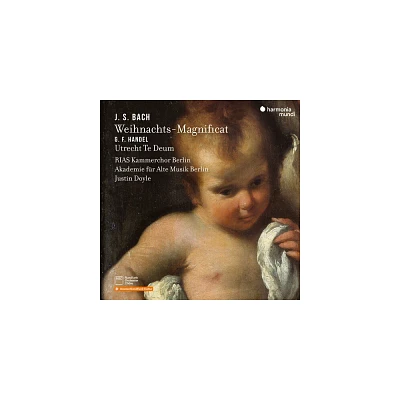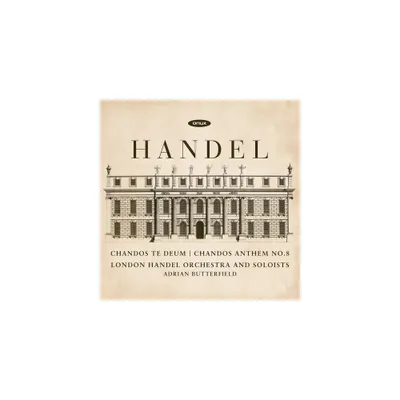Home
J.S. Bach: Weihnachts-Magnificat; G.F. Handel: Utrecht Te Deum
Loading Inventory...
Barnes and Noble
J.S. Bach: Weihnachts-Magnificat; G.F. Handel: Utrecht Te Deum
Current price: $25.99


Barnes and Noble
J.S. Bach: Weihnachts-Magnificat; G.F. Handel: Utrecht Te Deum
Current price: $25.99
Loading Inventory...
Size: OS
*Product Information may vary - to confirm product availability, pricing, and additional information please contact Barnes and Noble
Bach
's
Weihnachts-Magnificat
("Christmas Magnificat"),
BWV 243a
(or, here,
BWV 243.1
), is remarkably rarely heard. It was actually the original version of
Magnificat
, performed in 1723, shortly after
took up his post at the Thomaskirche in Leipzig. Reflecting local practice at the time, the work includes four Christmas hymns, two in Latin and two in German, interpolated among the usual Latin sections. There are also a few other changes; the work is in E flat major, not D major, recorders are heard instead of the later transverse flutes, and there are other differences of orchestration. Without a doubt,
's later version is more compact and unified, and few would want to replace it with this one. But the
deserves to be heard more often, and not only at Christmas time, not least because it conveys something of the religiously fluid quality of Germany at the time. The album made classical best-seller lists in the autumn of 2024. The performances here, by the 37-voice
RIAS Kammerchor Berlin
and the venerable
Akademie für Alte Musik Berlin
, are superb; stinting on the forces, in a work that
clearly meant as splendid, will not do, and conductor
Justin Doyle
forges a rich, warm sound.
Doyle
Handel Te Deum in D major, HWV 278
, commemorating the Peace of Utrecht in 1715, is equally good; he gets a feeling of genuine exuberance from these veteran musicians that reflects how the work must have been heard in its own time. The soloists, especially countertenor
Alex Potter
(sample the
Esurientes implevit bonis
in the
), are very strong. Not so great is the sound, from Berlin's Jesus-Christus-Kirche; no one could say that it is not an idiomatic space, but the soloists tend to be swallowed up in the treatment here. Nevertheless, this is a fine recording in what might be called the early music old-school manner, with an especially valuable choice of repertory. ~ James Manheim
's
Weihnachts-Magnificat
("Christmas Magnificat"),
BWV 243a
(or, here,
BWV 243.1
), is remarkably rarely heard. It was actually the original version of
Magnificat
, performed in 1723, shortly after
took up his post at the Thomaskirche in Leipzig. Reflecting local practice at the time, the work includes four Christmas hymns, two in Latin and two in German, interpolated among the usual Latin sections. There are also a few other changes; the work is in E flat major, not D major, recorders are heard instead of the later transverse flutes, and there are other differences of orchestration. Without a doubt,
's later version is more compact and unified, and few would want to replace it with this one. But the
deserves to be heard more often, and not only at Christmas time, not least because it conveys something of the religiously fluid quality of Germany at the time. The album made classical best-seller lists in the autumn of 2024. The performances here, by the 37-voice
RIAS Kammerchor Berlin
and the venerable
Akademie für Alte Musik Berlin
, are superb; stinting on the forces, in a work that
clearly meant as splendid, will not do, and conductor
Justin Doyle
forges a rich, warm sound.
Doyle
Handel Te Deum in D major, HWV 278
, commemorating the Peace of Utrecht in 1715, is equally good; he gets a feeling of genuine exuberance from these veteran musicians that reflects how the work must have been heard in its own time. The soloists, especially countertenor
Alex Potter
(sample the
Esurientes implevit bonis
in the
), are very strong. Not so great is the sound, from Berlin's Jesus-Christus-Kirche; no one could say that it is not an idiomatic space, but the soloists tend to be swallowed up in the treatment here. Nevertheless, this is a fine recording in what might be called the early music old-school manner, with an especially valuable choice of repertory. ~ James Manheim


















